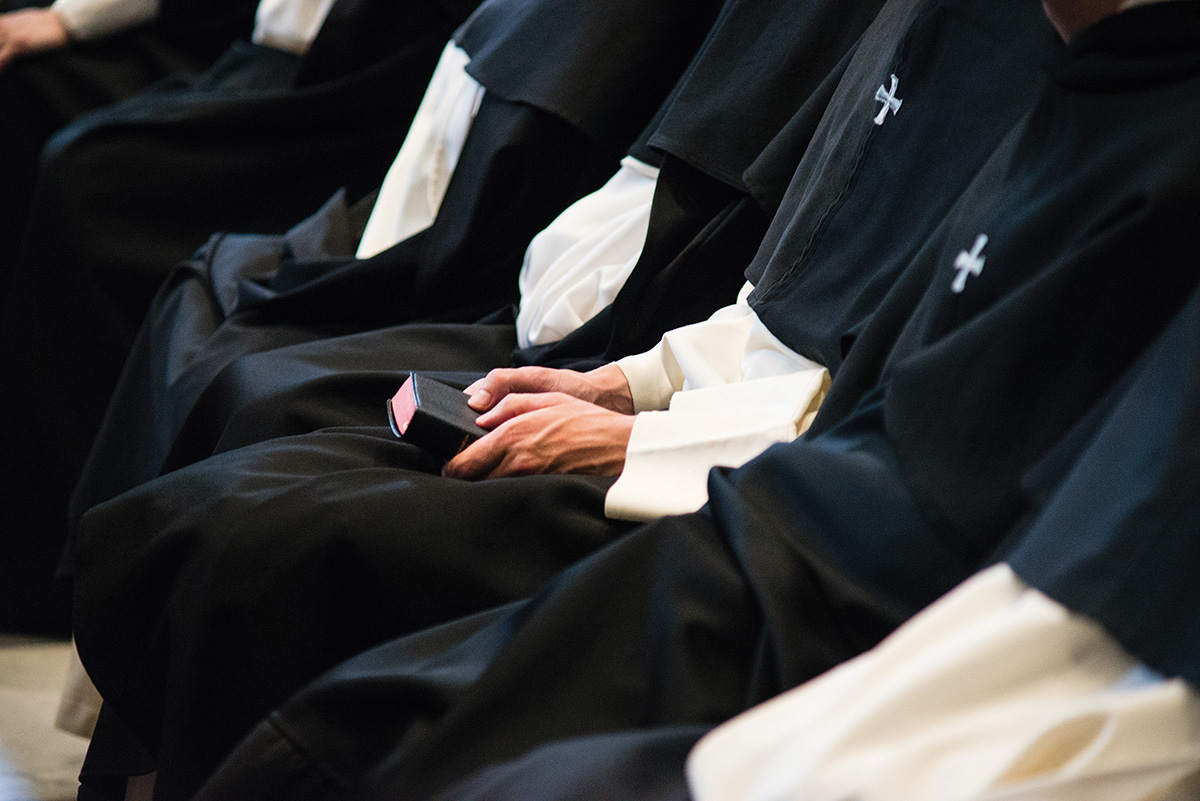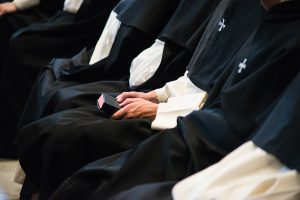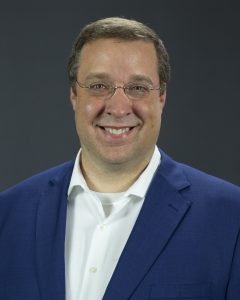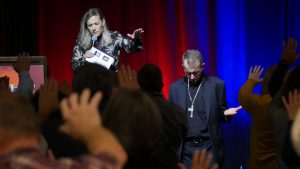
Dominican monks, detail of the monastic habit, monastic order of the Catholic Church, Rome
Question

Can you explain/describe the various orders such as Dominicans, Franciscans and Jesuits? Do all priests belong to an order? Do the orders for priests and religious brothers differ from the orders for the religious sisters?
Answer
We’ve got another good question this month, because while most of us are familiar with the reality of religious orders in the Church, far fewer of us have a deeper understanding of their origins, how they relate to one another and to diocesan priests, etc. Because it would take at least one column to do justice to each of the major religious communities, including those present in our diocese, this month I’d like to offer some broad explanations of religious orders in the Church. Perhaps in future columns we will be able to explore some of them more fully.
We know from the New Testament and the Church teaching that flows from it that Jesus established the Apostles as the leaders of the Church, and they in turn ordained successors (bishops) to govern with their authority, as well as other men (deacons) to serve the needs of the local community. We also know that by the end of the first century bishops ordained priests as a “middle level” of Holy Orders between bishops and deacons. Those priests were what we have come to call diocesan priests—men ordained to serve the needs of the parishes within a diocese. Diocesan priests, then, are not members of a religious order.
But it’s during the same time period (the New Testament era, the rest of the first century and the second century) we see the development of religious life, at least in embryonic form. There were disciples of Jesus Christ who sought to devote themselves more fully to the new Christian faith. For example, we find in the writings of St. Paul references to widows and virgins who helped build up the early church. These women were the first forms of religious life—what would later become religious orders—within the Church.
In the decades and centuries that followed, some men followed suit, such that by the third century we read about the “desert fathers,” hermits who spent their days in prayer in the desert, sometimes gathering a following of others around them. And some of them, but not all, were ordained as priests.
As time passed, communities of religious life developed, the vast majority of which arose around an individual recognized for his or her great holiness of life. In the West, the most notable such figure was St. Benedict, who wrote a set of basic rules to govern the life of the monks who’d gathered around him. Groups of women, likewise, came to follow the Rule of St. Benedict and from that arose the many religious communities that trace their origins to St. Benedict and his Rule.
Other religious orders likewise were founded around a figure of great holiness, although they were (and are) not always monastic. For example, St. Dominic and St. Francis each founded an order of friars, men who, like monks, took vows of poverty, chastity and obedience, but who moved from place to place instead of remaining in a large monastery as monks would. St. Ignatius of Loyola founded the Society of Jesus, an order of men devoted to his way of life, just as Franciscans and Dominicans sought to follow the example of St. Francis and St. Dominic.
Looking to some of the other orders in our diocese in addition to the Benedictine communities in Yankton and Watertown, the Presentation Sisters were founded by the Irish woman Nano Nagle in the eighteenth century, the Priests of the Sacred Heart in Chamberlain were founded by the French priest Leon Dehon in the nineteenth century.
From the early centuries, the Church has seen, in the great variety of religious communities and the charisms they each live out, a reflection of the faith. Just as a ray of light, when shone through a prism, refracts into a multicolored rainbow, so, too, does the Gospel of Jesus Christ take life in a great variety of ways throughout the centuries and around the world.
 Be sure to check out the additional resources at sfcatholic.org/answer. If you have a question you need an answer to, email rkranz@sfcatholic.org.
Be sure to check out the additional resources at sfcatholic.org/answer. If you have a question you need an answer to, email rkranz@sfcatholic.org.
Chris Burgwald holds a doctorate in theology and is the director of Adult Discipleship and Evangelization for the Diocese of Sioux Falls.


